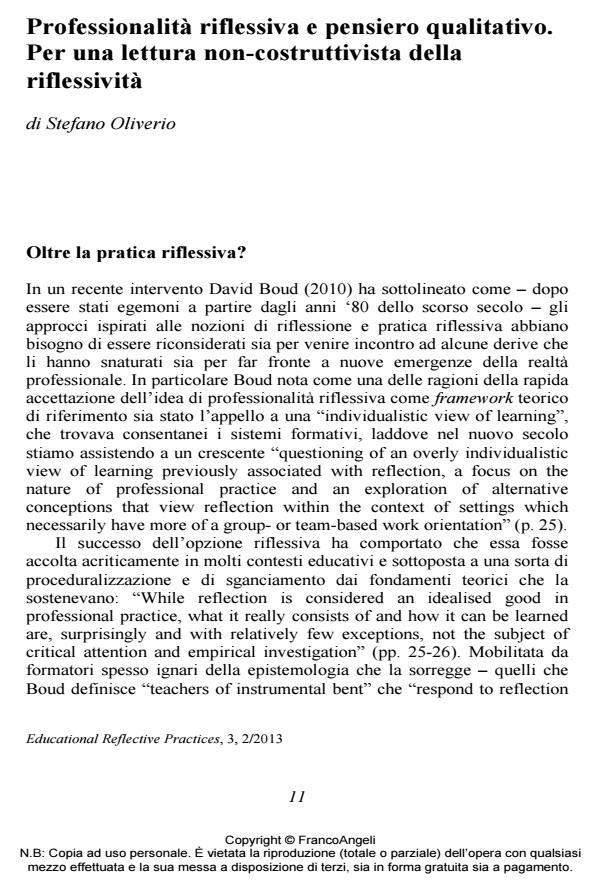Professionalità riflessiva e pensiero qualitativo. Per una lettura non-costruttivista della riflessività
Journal title EDUCATIONAL REFLECTIVE PRACTICES
Author/s Stefano Oliverio
Publishing Year 2014 Issue 2013/2
Language Italian Pages 21 P. 11-31 File size 605 KB
DOI 10.3280/ERP2013-002002
DOI is like a bar code for intellectual property: to have more infomation
click here
Below, you can see the article first page
If you want to buy this article in PDF format, you can do it, following the instructions to buy download credits

FrancoAngeli is member of Publishers International Linking Association, Inc (PILA), a not-for-profit association which run the CrossRef service enabling links to and from online scholarly content.
In contemporary debate appeals to go beyond reflective practice in professional development have been made due to the ‘proceduralization’ this has experienced in many educational contexts and to the changing scenarios which could render it out-of-date. The paper engages with this question by arguing that we need a reconstruction of reflective practice rather than its overcoming. In particular, focusing on Donald Schön’s model, this present contribution insists on its permanent value but it also highlights how the constructivist framework into which Schön situated his approach should be revised. In this perspective it is shown, on the one hand, how reading the educational experience ongoing in the reflective practicum only in terms of learning (by excluding any ‘teaching’ dimension) could be misleading; on the other, by mobilising the Deweyan notion of qualitative thought and the Heideggerian idea of Verstehen, it is pointed out how a ‘realistic’ (as opposed to constructivist) dimension is necessary to reflective practice, also in order to fully valorise its embodied character.
- Riflessività e pratiche del sé professionale Stefano Oliverio, in EDUCATIONAL REFLECTIVE PRACTICES 1/2023 pp.23
DOI: 10.3280/erp1-2023oa15873 - Una epistemologia post-umanista della riflessività? Loretta Fabbri, Claudio Melacarne, in EDUCATIONAL REFLECTIVE PRACTICES 1/2023 pp.5
DOI: 10.3280/erp1-2023oa16224
Stefano Oliverio, Professionalità riflessiva e pensiero qualitativo. Per una lettura non-costruttivista della riflessività in "EDUCATIONAL REFLECTIVE PRACTICES" 2/2013, pp 11-31, DOI: 10.3280/ERP2013-002002